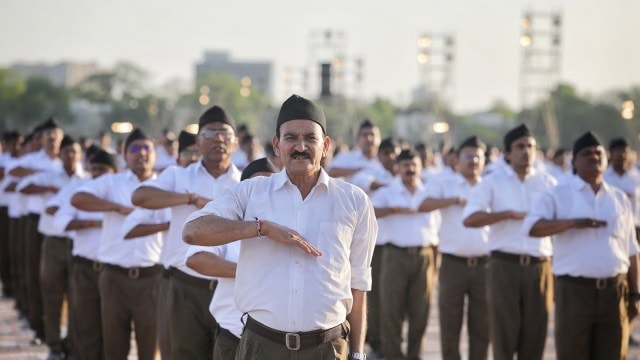
Written by Parvesh Sahib Singh
When the Rashtriya Swayamsevak Sangh (RSS) completes its centenary journey, it is not merely the celebration of an organisation turning 100. It is, in fact, the celebration of India’s living spirit; a spirit that has carried us through adversities and steered us towards self-confidence and self-respect.
A hundred years ago, in Nagpur, Dr Keshav Baliram Hedgewar planted a small seed of discipline and devotion. Today, that seed has grown into a massive banyan tree, spreading its shade not only across India but also to countless communities around the world.
The story of the Sangh over the past century is not about slogans or speeches. It is about disciplined, silent, and sustained nation-building. From its inception, the RSS instilled in its volunteers a simple yet profound mantra: Nation first, self later. Every shakha (daily gathering), every prayer, every humble act of service reflects this guiding principle.
The identity of the Sangh is not limited to khaki shorts or saffron flags. It is defined by the values and cultural orientation it instills in each swayamsevak. The Sangh’s vision has always been inclusive and service-driven, reaching out to the most marginalised and neglected sections of society.
Be it in education, health care, rural development, or disaster relief, the RSS has quietly contributed without seeking recognition or headlines. The underlying philosophy has always been clear; power and fame are never the goals. True service lies in sacrifice, humility, and dedication to the nation.
For me, the Sangh’s century-long journey is not just history; it is deeply personal. My father, the late Sahib Singh Verma, was a lifelong follower of the RSS ethos. He taught us that whether one chooses politics or social service, the foundation must be built upon the values imparted by the Sangh.
Discipline within the family, the importance of organisation, and devotion to the nation — these were not abstract lessons for us but daily practices rooted in the Sangh’s culture. Today, as I serve the people of Delhi in public life, I can see clearly that my path has been shaped equally by my father’s example and the Sangh’s guidance.
The Sangh’s century has not been without trials. It has faced challenges from colonial rulers, endured the darkness of the Emergency, and withstood numerous attempts to divide Indian society. Yet, in every instance, it responded not with anger or violence, but with patience, discipline, and unwavering resolve.
This discipline has been the secret behind the Sangh’s strength. It has inspired millions of volunteers to dedicate their lives to society without seeking personal recognition or power. The Sangh has produced countless leaders and workers who preferred anonymity to limelight, but whose contributions have left an indelible mark on India’s journey.
It would not be an exaggeration to say that the RSS has been central in awakening a sense of nationalism in modern India. For generations of youth, the Sangh has provided a vision larger than personal ambition. It has shown that an individual’s true fulfillment lies in working for the collective progress of the nation.
One of the Sangh’s greatest contributions has been reviving pride in the idea of Bharat Mata. The slogan “Bharat Mata ki Jai” first echoed in a Sangh shakha. Today, it reverberates in every corner of India, symbolising not just patriotism but also spiritual unity.
When we look back at these hundred years, it becomes clear that the Sangh’s journey is not merely organisational; it is civilisational. India has always been rich in spirituality and culture, yet foreign domination sought to suppress this soul. The RSS rekindled that inner spirit, reminding us that our identity is not bound by caste, language, or religion, but by the shared love for Bharat Mata.
The Sangh’s work has been to restore India’s self-confidence, to tell every Indian that we are heirs to a great tradition, and that we must rise again as a strong, united nation.
As the RSS marks its centenary, it is not only a moment of pride but also a moment of responsibility. The coming century will demand even more from the Sangh and from all of us inspired by it.
India is on the cusp of becoming a global leader not just economically or politically, but also morally and culturally. The Sangh’s role in this journey is critical. It reminds us that material progress alone cannot sustain a nation. True greatness lies in the strength of values, the purity of character, and the power of collective discipline.
In an era where the world is caught in the race for materialism and consumption, the Sangh continues to offer an alternative model — one rooted in service, ethics, and spiritual strength. It tells us that the real measure of progress is not wealth or power, but the moral fiber of a nation.
For me, this centenary is more than a celebration of an institution. It is a moment of reflection and gratitude. When I think of my father, I see in him the imprint of Sangh’s values. His belief that “the individual is small, the organisation is great” continues to guide me. His conviction that “power is temporary, but service is eternal” echoes in my work every single day.
The RSS has given my family and me a direction; a compass that always points towards service, discipline, and national pride.
The centenary of the RSS is not just an organisational milestone. It is a festival of India’s soul, a testament to how discipline, unity, and service can shape the destiny of a nation.
This journey of a hundred years teaches us one powerful truth: When society is organised, when every citizen lives with a spirit of sacrifice and service, the nation becomes unshakable.
The Sangh has given India this strength. And as we step into the next hundred years, it will continue to guide us towards becoming not just a prosperous nation, but a moral and cultural Vishwaguru — a teacher to the world.
The writer is a Delhi Minister